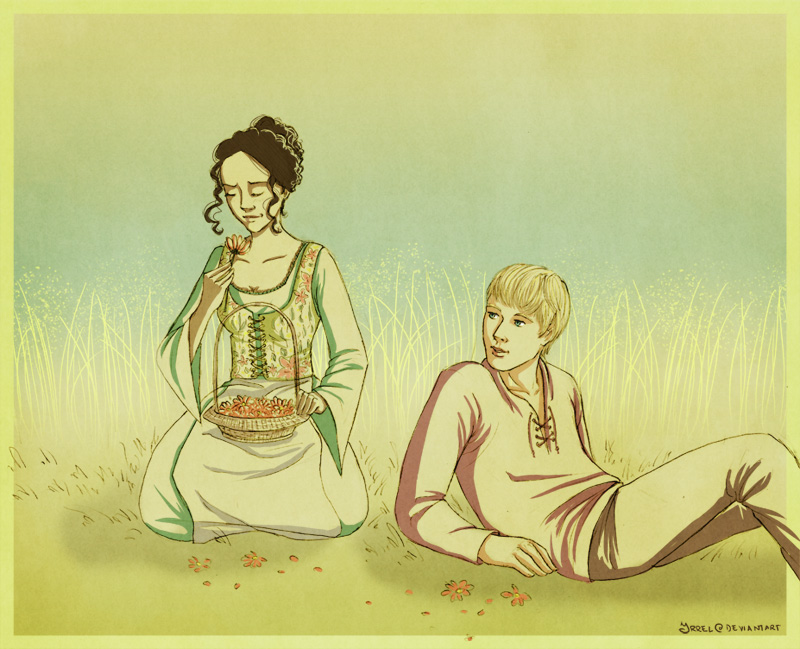On the night the queen would hold court, the people marched to her castle in unison. Along the way, they picked a few flowers. Perhaps the kids could be banned from picking, but the queen could not tell everyone what to do. So they marched and carried flags and climbed the castle stairs together.
There
were too many citizens to fit inside her meeting quarters, so they asked for a
larger room, a venue, one of her words, but the queen refused. So they packed,
stuffed and sweaty, in a room that used to hold peasants, but was now refurnished
for the monarchy.
Seated
with the queen was the rest of her court, the three wise men from before, but
also four brave nights and a maiden.
The
parents spoke, upset with the queen.
“Why
have you not responded to us?”
The
queen did not answer.
“It’s
not right to ban flower picking. You have no reason. You have no evidence of its danger.”
The
queen didn’t feel she needed to give any.
The
children spoke too. They were eloquent, well-behaved, speaking of their love
for flower picking, and how picking in one spot was just simply too dull.
“Overturn this ban,” they pleaded. "Lift our spirits.”
Some
citizens who were not parents of pickers themselves even spoke. They also did
not like the way the queen and her court were behaving.
Then
one member of the audience, the mother of two fine pickers, chastised the queen
for disobeying the laws of the land. “You cannot make laws that affect the
people without first asking the people. It is written in your charter.”
The
people cheered at this. The queen looked worried, but still she did not speak.
Only
one person spoke in favor of banning flower picking. He mentioned the tough job
the queen and her court had to perform. It appeared he curried favor, a job, a knighthood,
from the queen. He said his own sister, once a flower picker, was bitten by a
dog.
“But
they could get bitten by a dog anywhere,” someone whispered, to another.
“A
star could fall out of the sky,” the person snickered back.
After
all the people spoke, they waited. Would the queen speak?
Instead,
the first knight spoke. He told the people that the ban on flower picking was
something they wanted. They had heard this before and still could not believe it.
They didn’t want flower picking? It was a distortion of the truth, but the
court thought that if they repeated it enough, the people would believe it.
Then
a fair maiden spoke. She liked the people and was chosen by them to serve on
the court. She apologized for the poor communication on the part of the queen.
She seemed to understand the parents’ frustration. But the ban on picking could
not be reversed. To say flower picking is dangerous and then say it is not
would be the sign of a weak kingdom, something that would not do. Besides, she
had spoken with a magistrate in the capital and he would not hear of lifting
the ban.
“A
magistrate? He knows what is best for our children? Not we parents?”
No
waivers would be permitted, though the parents had signed many before, never
wavering, not even now.
Then
the bravest knight of all spoke. He had fought many battles, and made sure the
people were reminded of it. He wished the children to know that he “loved them,
he loved them all.” But he did not think drudgery should be any consideration:
“In my day, when we prepared for battle, it was pure slog, downright tedium I
tell you. Such toil is good for the soul. So
buck up kids.” He also wanted to relay a message. “Besides, all this energy you
are expending should be put toward your studies.” The children, among the best students in the
Land of Rad, thought him haughty. Many of them were better spoken than he.
Another
knight spoke, and he appeared somewhat open to cooperation, but he offered no
specifics. Forward, he said, onward. Where? The people wondered. And then the
last knight spoke. He said that this was the largest group of people that had
ever gathered in the kingdom, and he was pleased. Not that his mind was changed
or anything. But it sure made things interesting for once. You try sitting
through these meetings.
The
parents left in frustration, all their work for naught. But they gathered
outside and talked more. They tried to sift through what they had just heard,
figuring out what to do next. The queen never herself never spoke, but clearly
she was afraid of this group of parents. If there had been one good thing to
come from the ban on flower picking, it was that the people were now banded
together, a community. People from different villages and neighborhoods were
friendly. People on opposite sides of different issues would now work together
to overturn the ban, to overthrow the kingdom.

